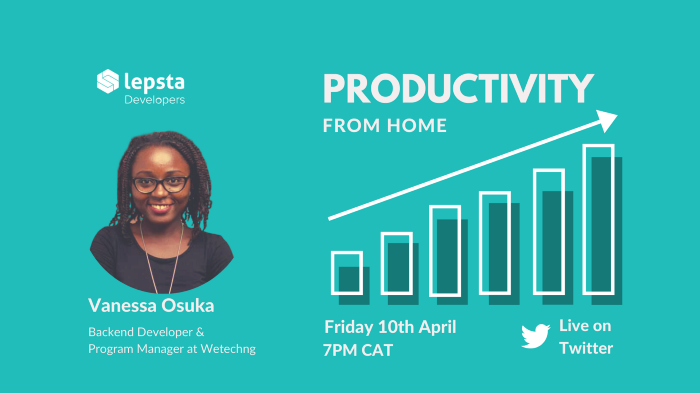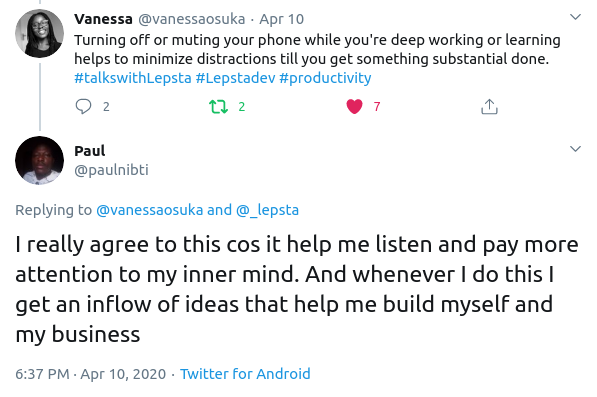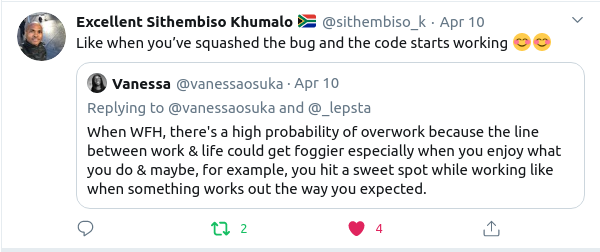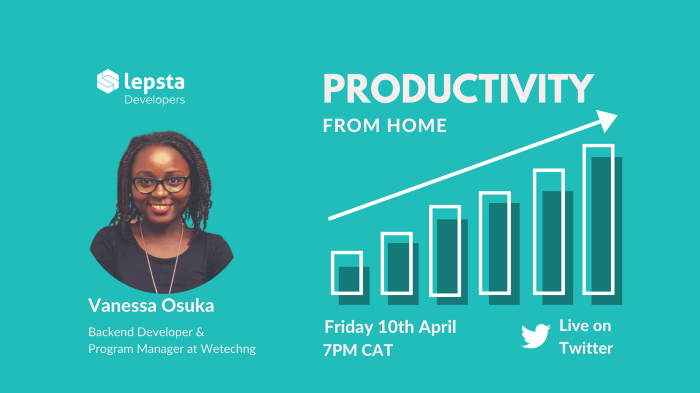
With Vanessa Osuka
Backend Developer & Program Manager at Wetechng
Anchored by Chioma James
Community Manager at Lepsta
In light of the global response to curb the spread of COVID-19 most of us are encouraged to stay at home. Although some people are used to working from home, this does present a new reality for the majority of us. Unfortunately, we have not been presented with many choices, we just have to try to adapt to reduce the effect of the pandemic on our lives.
Starting is not the issue though, but how to become productive and achieve your daily targets can be challenging in this configuration.
On Friday the 10th of April 2020, we had our first online event for the year on how we can achieve goals and adjust to this new reality by our guest speaker Vanessa Osuka. Read on how you can be Productive from Home.
Let’s Dive In
Okay so let’s kick things off; productivity from home, how?
First off, I think it’s important we redefine productivity, especially at this time. The term is being tossed around a lot these days. Having a balanced view of what productivity is or should be in the context of this present time is important & helps to quell any unnecessary pressure.
Times are pretty confusing, it’s okay to not be churning out a ton of work, sporadically checking off to-dos and moving tickets.
Now the question is; How can tech professionals/entrepreneurs or developers be productive from home?
“There are no rules for being productive.
While at home or working from home, the most important thing is picking up and adjusting to habits that work for you and make you happy because that’s very key.
I’ve had to try a lot of habits and things before finding what scales for me and that’s even still evolving.”
However, there are a couple of fundamentals that could probably act as a base template for anyone looking to switch to working from home (WFH) or trying to adjust to remote life at this time.
Intentional
Being intentional about how we spend our time is one. When WFH(working from home), there’s a tendency to be very relaxed about things and procrastination could slyly creep in, time slowly ebbs away and the cycle repeats…
Planning
I’ve realized that my most productive days happen when I plan the day before. Having a checklist or at least a mental map of some important task(s) I want to get done the next day helps me stay on track.
I used to think to have a daily checklist is self constricting. So for a while, I stalled on picking up that habit. It’s not. As long as we make it flexible and see it more like track lines to jolt you back to the path as opposed to something like a fixed program of events.
Routine
Having a morning routine (evening or what works for you) also contributes to a productive day. Productivity starts with the mind so it helps to bring some self-awareness and deliberateness to your morning activities.
A typical morning routine for me usually means resisting all the urge to not check my phone first thing in the morning (Lol). Instead, trying to get centred which usually involves tea, music and gathering thoughts and projections for the day, a few times in quick writing. And this is not like a fixed thing, days I sleep late I can’t wake up early to observe all that protocol but generally, it helps me feel more organized and be in control of my day. Again, this may not work for everyone but it sure works.
Questions
- What are the possible challenges one can encounter while aiming to be productive?
Answer
Distractions are like the number one culprit. They are everywhere and they can mess with productivity without even knowing. This is where being intentional about your time helps because it kinda injects some level of discipline along.
Minimizing distractions as much as possible is important, though I think this can be very very tricky and kinda hard because there’s a lot of distractions at home. Talk about occasional pop-ins from family members or you forget to mute your phone and a call comes in that forces you to readjust your day.
Dedicated Space
However, one thing that works for some people (myself included) is having a separate work-from-home space so this sends like a DND message to others at home. Turning off or muting your phone while you’re deep working or learning helps to minimize distractions till you get something substantial done.

Even if one doesn’t have a separate workspace set up yet, productivity is still possible. Not having a “perfect” workspace with multiple screens and all the fancy stuff shouldn’t be a hindrance to getting stuff done and having the fancy stuff(even though if it aids) doesn’t always guarantee productivity.
So yeah, being able to manage the distractions that come with WFH (Working from home)is key to staying productive.
2. How can techies strive for balance while staying productive?
Answer
Taking breaks.
The importance of taking consistent productive breaks cannot be overemphasized. A break is productive when it accomplishes its purpose, that is, it helps you recharge physically and mentally, feel good and ready to push on.
Examples of productive breaks are: stepping away to take a walk, doing yoga, taking a nap or a dance workout. The idea is to do something that makes you feel good within.
For example, we can’t exactly call a break spent texting and catching up on internet videos productive. While those are not bad, we could also switch it up with stuff like stepping away to take a walk, doing yoga, or maybe if you’re weird like me, practising a dancing routine lol. The idea is to do something that makes us feel good within.
Overwork and Balance
When WFH, there’s a high probability to overwork because the line between work and life could get foggier especially when you enjoy what you do and maybe, for example, you hit a sweet spot while working; like when something works out the way you expected. But like it’s being said, too much of a good thing can become toxic. So taking a break keeps the mental suspense and energy level constantly up.

Besides it also helps to maintain a balance, cause you get to reconnect with other parts of life like family, hobbies and the likes so even when something doesn’t work out you can make it up and prevent it from ruining your day.
To be honest, sometimes this balance thing can be hard, sometimes you don’t even realize when you’ve forgotten the line between work and other aspects of your life and before you know it you’re burning out without even realizing.
Personally what I do is some days I work out from a park. Being someone who likes to be in tune with nature, working from a park or somewhere with that natural feel helps a lot. So you need to figure out what works for you and merge in and it doesn’t always have to work the whole time you’re working out. It shouldn’t be. Take some time to breathe and recharge. I usually like to go on a small screen instead of a laptop.
But of course, in the wake of the current situation, working out in a neutral space is impossible. So I guess this is where we get to be creative about the concept of taking breaks.
Like I mentioned earlier, taking a break could mean different things to different people and that’s great. For some, it could be practising a dance routine, for others, it could be doing karaoke, connecting with friends, playing your favourite game, watching a cartoon(like me, lol.) Generally, whatever works and makes you feel good even if it sounds weird to someone else because your happiness and mental health is very key.
3. What tools can enhance one’s productivity?
Answer
There are lots of great tools out there. I try to keep my ‘toolbox’ as minimalist as possible so I’m not sure I have like a long list of tools but I use Notion to keep track of things, Pomodoro browser extension for keeping track of time and breaks, Zoho for logging time and invoicing Pivotal Tracker, and a physical notepad for writing.
Here is a compilation of possible tools out there that can enhance your productivity;
- Asana.
- Lepsta
- Notion.
- Trello.
- Zoho.
- Grammarly.
- Google calendar.
- Pivotal Tracker.
- Pomodoro technique.
- Physical notepad.
- And countless more out there.
4. How can I measure my productivity?
Answer.
I doubt there’s a single yardstick for measuring productivity, productivity is simply getting things done promptly so in essence meeting deadlines is one major way to measure your productivity.
Also, I don’t think it’s practical to say one would be like 100% productive 7 days a week while home.
There are days where we might not get to do as much we’d like to but sometimes the plot twist is that even on days we’re not consciously productive, we usually are, subconsciously or indirectly.
That’s because even when you’re away from the screen, for example, chances are that you probably spend some time intermittently during that day to think about a problem or perhaps how to approach the next task(s) in a project. And that spikes your productivity when you get back so it adds up too.
Summary
In summary, here are some tips for ensuring productivity while at home:
- Plan the day before, as much as possible try to have a checklist mentally or in print of what you want to do.
- Make your morning count.
- Knock off the easier tasks first.
- Try to stay balanced as much as possible and stay healthy.
- Be intentional.
- Indulge in self-care, practice setting boundaries and saying no.
- There are no rules, do what works for you and fine-tune along the way.

Vanessa, a back end developer, and technical writer from Lagos Nigeria. She is passionate about open-source, JavaScript and backend technologies. She is the program lead for WeTechNG, a diverse community of women in technology across sub-Saharan Africa.
You can follow Vanessa Osuka via her twitter handle @ VanessaOsuka and Lepsta on twitter @Lepsta for more educative and insightful events. For the full conversation, see the #talkswithLepsta thread on twitter.
PS: Originally published on Medium

